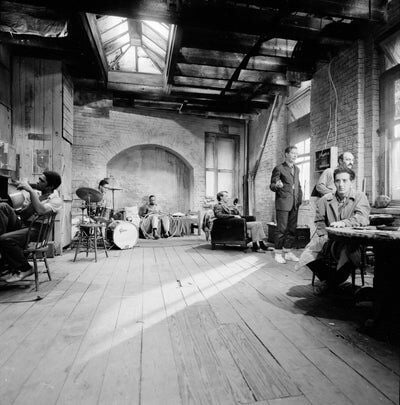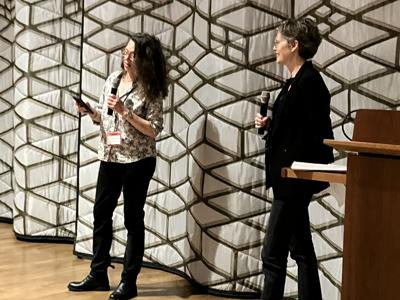“Repulsive.” That was the verdict of New York Times film critic Bosley Crowther, the poster boy for antediluvian mainstream film criticism in the 1950s and 1960s, when Shirley Clarke’s “The Connection” was released in 1961.
Current New York Times film critic Manohla Dargis begs to differ. Dargis selected “The Connection” to screen at this year’s Wisconsin Film Festival Friday afternoon at the Chazen Museum of Art.
Dargis is a fan of Clarke, a trailblazing female filmmaker who until recently was largely marginalized and forgotten. But this was the first time Dargis had seen this film on a big screen, in a luminous restored 35mm print from Milestone Films.
She started crying, she said.
“I’m so deeply moved that this woman made this movie,” Dargis told the audience in a lively post-show conversation with festival director Kelley Conway. “It’s amazing.”
“The Connection” is a mock documentary, based on Jack Gelber’s 1959 play, set in a rundown New York flat where a group of heroin addicts are waiting for their supplier, Cowboy (Carl Lee) to arrive.
If you’ve seen a few Hollywood addiction dramas like “The Boost” or “Man with the Golden Arm,” your cinematic muscle memory would make you tense up for a movie that’s bleak and moralizing. When a newbie is reluctantly convinced to take his first hit, or another goes back for seconds, I expected them to be punished by the movie for their sins.

Shirley Clarke's "The Connection" centers on a group of heroin addicts waiting for their supplier to arrive.
While “The Connection” is unsparing about its subjects, Clarke is non-judgmental, finding the beauty in these lives as well as the tragedy. It’s also — dare I say this about a movie about heroin addiction? — a blast to watch, funny and energetic and alive. The talented actors address the camera directly, their hungry eyes connecting with the viewer in Milestone’s needle-sharp restoration, and the camera whips around the apartment as a quartet of jazz musicians make the soundtrack bounce.
“It’s so not moralizing,” Dargis said. “They take drugs, and they play beautiful music, and they hang out, and they take more drugs.”
Perhaps even more radical than the humane eye that Clarke brings to Gelber’s play was her decision to adapt it as a mock documentary, with a jittery director (William Redfield) exhorting the junkies to “act naturally.” As the junkies taunt the director and his faux-authentic vision (“Wake up, we’re in the movies, baby”), “The Connection” pokes fun at the relationship between artist and subject in ways that resonate with the glut of ethically suspect documentaries that clog today’s streaming services.
At the film fest screening, Dargis and Conway talked about Clarke’s life story, which would make a great movie in itself. Clarke was a “Park Avenue rich girl,” in Dargis’ words, who abandoned her husband and her upper-class life to become a dancer and filmmaker. She made daring films that blurred fiction and fact. She inspired other filmmakers (she famously lent a camera to John Cassavetes to make “Shadows”) even as film critics and historians dismissed her.
“The Connection” played out of competition at the Cannes Film Festival, but never got American distribution after it couldn’t pass a New York censor board — not because of the drug use, at least officially, but because of a single use of profanity and quick shot of a nudie magazine.
Clarke, who died in 1997, seems to be finally getting her due, thanks to new restorations and the appraisal of contemporary critics like Dargis. Screenings of her unforgettable films, like “The Connection,” could reach a new generation of cinephiles. As one of the addicts says at the end of the film, “It’s all yours now.”
The Wisconsin Film Festival continues on the University of Wisconsin-Madison campus through Sunday and at Hilldale through Thursday. The full schedule is available at wifilmfest.eventive.org.





